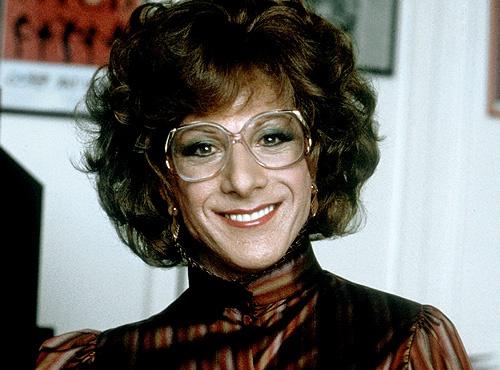Hi, welcome to "Her Power".
"Her Power" will take you to understand the outstanding women in literature, art, politics, science and technology, and try to objectively present the difficulties faced by these outstanding women in different eras and their coping methods, so that you can absorb their wisdom and strength.
Today, I'm going to take you through a special woman— the female figure played by Dustin Hoffman in "Lady Dowdy."
I am proud and blessed to be this woman. It's the best role I've ever had as a man in my life.
- "Lady Boy"

Dustin Hoffman's "Sister Docy"
"Sister Docy" wears a pair of gold-rimmed glasses and has curly blonde hair, and although she wears heavy makeup, she still can't hide her faint mustache; when she laughs, the wrinkles at the corners of her mouth look a little incongruous.
When "Sister Docy" came to the soap opera "Southwest General Hospital" audition, she was different from other actresses, she could be gentle and angry, tough and at the same time intelligent, so that she finally got the audition role. However, the male director said that this "Doxie" made him uneasy.
In fact, the director's "uneasiness" is not entirely unreasonable - because "Dosy" is not a woman, but the result of an actor facing an unemployment crisis "dressed as a woman".
This "hermaphrodite" setting makes Dorse show a personality that is completely different from social expectations - although she has a feminine appearance, she is not bottomlessly gentle and withdrawn, but uses her own toughness to stick to her position.
There are a lot of humorous plots in the film, in which the rivalry between "Sister Docsy" and "Homango" provides full jokes - when Homango expresses his admiration for powerful women and tries to "tongue kiss" Dosy, he is given a "head-on blow" by Doshi holding the props in his hand.
And after hitting the other party, Dorse did not forget to add, "You underestimated me, and if you want to win my heart, you have to rely on your brain, not your mouth." ”
Sister Doxi's personality adds a lot of brilliance to the plot of "Routine" - in the face of female patients who have been abused by domestic violence, she changed the line "Let her go to the psychologist", but said: "Why do you want to move?" That's your home. What would I do if a man did that to me? I'll pick up the biggest thing around me and smash his head open, and I'm not going to let them hit me again. ”
Dorse's happy performance has won her a lot of fans, she received letters from fans like snowflakes, began to shoot promotional films, magazines, and this drama also rose by 3 points due to her influence.
Dowsy's awakening, however, is not universal. In that era, most people still had a prejudice against the setting of women. For example, the other female figures around Dorse are not strong, independent and assertive positive images, they are either "hospital sluts" - harassed by male patients, suppressed by male supervisors; or female patients with blue noses and swollen faces - who have given birth to two children and are asked to see a psychologist after domestic violence.
And this phenomenon is very common in movies. The famous feminist scholar Annette Kuhn pointed out that in film, women are also often socially structured as "others" or "outsiders" in a male-dominated world. Women can't tell their own stories because the images are controlled by men. Women are often seen as sexual objects, and only their beauty and sexual attractiveness are valuable. Their function is focused on supporting men, they rarely live a life of self-satisfaction, and marriage and family —rather than meaningful careers—are their most common purposes.
Because of this, Dorse's image is so precious in the context of the times. However, the charm of this film does not stop there, "Lady Lady" also expresses a lot of reflections on the social status of women: how can women remain attractive without starving? How much does it cost to wear women's underwear and cosmetics? Is it complicated to do women in the 80s?
The film explores women's issues in a light-hearted and humorous way, and although it was shot in 1982, it still seems very appealing today. It won the 55th Academy Awards and was nominated for Best Director, Best Picture, and Best Actor. And Dorsey's sister is played by the famous movie star "Dustin Hoffman".
Dustin Hoffman
The power that "Sister Docy" leaves for every woman is:
Although the "Southwest General Hospital" is only a virtual scene in the soap opera, it is a microcosm of the survival status of women - Dr. Homan, who is not even familiar with the lines and needs to follow the teleprompter, always appears as a "leader"; the clever Julie can only show the image of a "hospital slut". Dorse's appearance allows women to see another possibility - in the face of the supervisor's harassment, she can boldly resist; in the face of the director's neglect, she can say out loud, "John's name is John, and I have my name too." She does not aggrieved her feelings, she does not imitate other people, and she does not fall into the model set by society for her. She lived only herself and told the people around her: Don't think of me as a woman, think of me as a person.
That's all there is today, if you like my article, you can follow "Her Power" or share it with your friends.
Have you seen the movie "Lady Boy"? Which character do you like in this movie? Welcome to leave a message in the comment area, thank you.